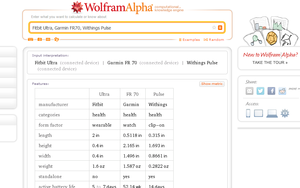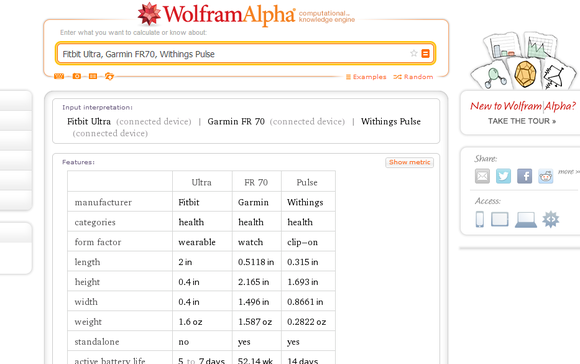If you're in the market for a 15-inch laptop, there are plenty of publications and gadget blogs eager to assist you with your choice. But soon, Wolfram Alpha hopes to make the selection process as easy as typing in a search box.
And then, once that's done, Wolfram hopes to connect all of the world's gadgets up and see what kind of data emerges. No big deal, right?
If you think this sort of ambitious project sounds a bit Google-y, you'd be forgiven. This is the kind of 'moonshot' that one normally associates with the self-driving car and Google Glass. But for Steven Wolfram, who took a degree in particle physics from Cal Tech at age 20, these are the kind of semi-obscure, aspirational projects that mean the most. Wolfram Alpha has always been a quiet player in search, simply providing answers to questions rather than selling ads.
 Wolfram Alpha
Wolfram AlphaWolfram Alpha already provides a live comparison of several fitness products.
Wolfram outlined the Connected Devices Project in a blog post this week, outlining plans first to create a database of products broken down by different categories. The second and more ambitious step is to connect them all to its network. Naturally, both steps will require some degree of crowdsourced data.
'In the end, we want every type of connected device to be seamlessly integrated with the Wolfram Language,' Wolfram wrote in the blog, referring to the language he and his company developed to describe the world last year. 'And this will have all sorts of important consequences. But as we work toward this, there's an obvious first step: we have to know what types of connected devices there actually are,' he wrote.
The Wolfram Connected Devices Project will work with device manufacturers and the technical community to provide a definitive, curated source of systematic knowledge about connected devices, Wolfram wrote.
What Wolfram is doing provides some competition to tech information sources like gdgt (acquired by Engadget last year), which provided both a discussion forum and a database of specifications. Other publications, including PCWorld, provide specifications and comparisons among various manufacturers.
The second phase of the project, Wolfram said, was to eventually connect all of the devices in the database into its network. To do this it would create a software driver with help from the manufacturer, which would tap into the specification data one each device via Bluetooth, ANT+, or some other connection.
 Wolfram Alpha
Wolfram Alpha'There are lots of possibilities,' Wolfram wrote. 'One can use Wolfram SystemModeler to have a model for a device that can be used to run a simulation in real time. Or, one can use the control systems functions in the Wolfram Language to create a controller with the device. Or in a quite different direction, one can use our Wolfram|Alpha-style linguistic capabilities to let end users make natural language or voice queries about data coming from a device.'
It's unclear how Wolfram would actually tap into data from something like a fitness device, which is dependent on users actually using it.
A more feasible result, however, is simply to create the database of gadgets that Wolfram outlined in the first step. As the caption of the illustration above notes, some of that functionality is already live.
The key differentiator for publications like PCWorld is that they employ human beings to actually use the products and advise you which products to buy. The question that provokes is how soon Wolfram will suck up and aggregate that data, too.
No comments:
Post a Comment